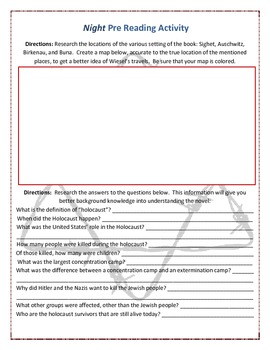

The trial of Adolf Eichmann in 1961 brought the Holocaust into the mainstream of American consciousness.
#Night book summary with text evi archive
Bernard Gotfryd/Hulton Archive - Getty Images (1965) Gertrude Samuels, writing in the Book Review, called it a “slim volume of terrifying power.” Alfred Kazin, writing in The Reporter, said Wiesel’s account of his loss of faith had a “particular poignancy.” After the Kazin review, the book “got great reviews all over America, but it didn’t influence the sales,” Wiesel said.Įlie Wiesel Credit. Although it had qualities “not brought out in any other book,” Pantheon had “always refrained from doing books of this kind,” meaning books about the Holocaust, he wrote to Borchardt.įinally, in 1959, Arthur Wang of Hill & Wang agreed to take on “Night.” The first reviews were positive. “However, we have certain misgivings as to the size of the American market for what remains, despite Mauriac’s brilliant introduction, a document.” Kurt Wolff, the head of Pantheon, also turned “Night” down. “It is, as you say, a horrifying and extremely moving document, and I wish I could say this was something for Scribner’s,” an editor there wrote to Borchardt. Although “Night” had sophisticated literary motifs and a quiet elegance, American publishers worried it was more a testimonial than a work of literature.

“The Diary of Anne Frank,” published in the United States in 1952, had been a huge success, but it did not take readers into the horror of the camps. “Nobody really wanted to talk about the Holocaust in those days,” Borchardt said. Georges Borchardt, Wiesel’s longtime literary agent and himself a Holocaust survivor, sent the French manuscript to New York publishers in 19, to little effect. The American response was similarly tepid. Still, “it was rejected by the major publishers,” Wiesel recalled in a recent interview, “although it was brought to them by François Mauriac, the greatest, greatest writer and journalist in France, a Catholic, a Nobel Prize-winner with all the credentials.” Les Éditions de Minuit brought it out in 1958, but it sold poorly. Mauriac urged Wiesel to rewrite the book in French and promised to write a preface. But it wasn’t until he returned to Paris and met François Mauriac, a noted Catholic novelist and journalist, that “Night” took the shape we know today. Working as a journalist in his mid-20s, Wiesel wrote the first version of “Night” in Yiddish as “Und di Velt Hot Geshvign” (“And the World Remained Silent”) while on assignment in Brazil. In the camps, the formerly observant boy underwent a profound crisis of faith “Night” was one of the first books to raise the question: where was God at Auschwitz? Wiesel writes honestly about his guilty relief at his father’s death. At Auschwitz, he watched his father slowly succumb to dysentery before the SS beat him to within an inch of his life. On his first day in the camps, Wiesel was separated forever from his mother and sister. In unsentimental detail, “Night” recounts daily life in the camps the never-ending hunger, the sadistic doctors who pulled gold teeth, the Kapos who beat fellow Jews.


Raised in an Orthodox family in Sighet, Transylvania, Wiesel was liberated from Buchenwald at age 16. It is also a case study in how a book helped created a genre, how a writer became an icon and how the Holocaust was absorbed into the American experience. How “Night” became an evergreen is more than a publishing phenomenon. In the late 1950s, long before the advent of Holocaust memoirs and Holocaust studies, Wiesel’s account of his time at Auschwitz and Buchenwald was turned down by more than 15 publishers before the small firm Hill & Wang finally accepted it. Indeed, since it appeared in 1960, “Night” has sold an estimated 10 million copies three million of them since Winfrey chose the book in January 2006 (and traveled with Wiesel to Auschwitz).īut “Night” had taken a long route to the best-seller list. The Times’s news survey department, which compiles the list, decided the Holocaust memoir wasn’t a new best seller but a classic like “Animal Farm” or “To Kill a Mockingbird,” which sell hundreds of thousands of copies a year largely through course adoptions. This fall, Elie Wiesel’s “Night” was removed from the New York Times best-seller list, where it had spent an impressive 80 weeks after Oprah Winfrey picked it for her book club.


 0 kommentar(er)
0 kommentar(er)
